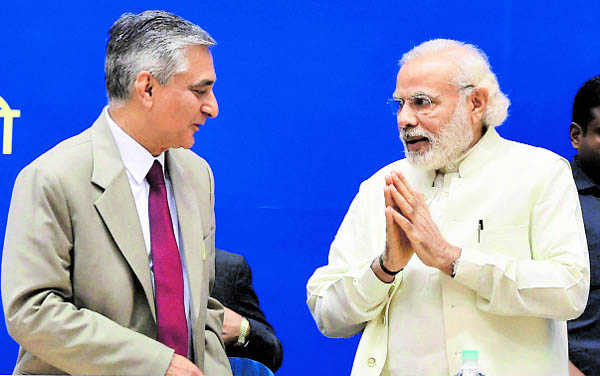
PM Narendra Modi with CJI TS Thakur during the joint conference of Chief Ministers and Chief Justices in New Delhi. PTI
Faizan Mustafa
THE BJP government’s first two years have been marked by an acrimonious relationship with the judiciary. Notable developments have taken place in the last few days in the executive-judiciary relationship. While no one can dispute that the independence of judiciary is not an end in itself and is rather an instrumental value defined by the purposes it serves, at the same time government's efforts to control the judiciary are dangerous.
Rejecting the charge of “judicial outreach” by the senior ministers of the Narendra Modi government, the Chief Justice of India in a recent interview with a television channel said that judiciary intervenes only when the executive fails in its constitutional duties. He boldly asserted that “the government should do its job instead of hurling accusations and that the people turn to the courts only after they are let down by the executive. If there is neglect and failure on part of government agencies, judiciary will ‘definitely’ play its role.”
On the last day of the Budget session, the Union Finance Minister had said in the Parliament that the “judiciary is destroying the edifice of Parliament brick by brick”. Recently, the government had rejected the reiterated recommendation of the collegium for the appointment of a Chief Justice in spite of absence of such a power with the government in the existing Memorandum of Procedure (MoP). The government has refused to clear the appointment of 110 judges till the MoP is finalised. The revised MoP drafted by the government was recently sent back by the Supreme Court as the collegium has serious reservations about some of its clauses which impinge on the independence of the judiciary.
(Follow The Tribune on Facebook and Twitter @thetribunechd)
Things had come to such a stage that the head of Indian judiciary could not control his emotions at the Chief Justices and Chief Ministers annual conference and had to cry in the presence of the Prime Minister to the delight of hardcore supporters of the government and others who see independent judiciary as biggest hindrance in their way and intend to bring the judiciary to its knees. The Chief Justice complained that the Modi government is sitting on as many as 170 recommendations for the appointment of judges to the high courts. He said that 434 judicial vacancies in the high court are waiting to be filled. Highlighting the acute shortage of judges due to the poor judge-population ratio, he recalled that in 1987 the Law Commission had recommended an increase in the number of judges from then 10 judges per 10 lakh people to 50 judges per one million people.
The MoP drafted by the government does have a few positive features: It says that no one should be allowed as the acting Chief Justice of a high court beyond three months. Till recently, we had more than half a dozen acting Chief Justices in various high courts; recording of reasons when a senior-most Chief Justice is overlooked for elevation to the Supreme Court; establishment of a permanent collegium secretariat and direct elevation to the Supreme Court of three advocates and one jurist. The provision of advocates has been used only in five cases and no jurist has so far been elevated to the Supreme Court. The MoP has also provided that all judges of the Supreme Court may make suitable recommendations for the appointment from the categories of lawyers and jurists. Some of the best judges in United States did come from the academia.
In another path-breaking provision, the new MoP states that there should be an evaluation of the judgments of the high court judges by the collegium before making recommendations to the President. Unlike the 1999 MoP, the new one for the first time introduces the controversial concept of “merit” in the appointment of judges. It talks of performance appraisal of judges in the appointment of Chief Justices of the high courts and elevation to the apex court.
It proposes that judgments of last five years delivered by the judge whose name is under consideration must be closely evaluated. How do we assess the quality of judgments is a question which has not received much juristic attention in India. Many States in the United States do have a “merit plan” under which the judicial performance of State Supreme Courts and other courts is evaluated for the retention of judges through vote or as a device for self-improvement. This insistence on “merit and integrity” as prime criteria would open the floodgates.
All appointments of ministers, governors, chairmen of various commissions, Censor Board, Indian Council for Social Science Research, UPSC members, Vice-Chancellors and secretaries, FTII and NIFT, etc. are made by the government. How much importance have successive governments attached to merit needs no elaboration. Similarly, the government cannot be allowed to reject any candidate in the name of so- called “national interest”. If a judge could continue in the high court as a judge, how can he become a threat to the national interest on elevation to the apex court?
Since the government has asked the Attorney General to respond to the objections raised by the collegium, one expects that some consensus would eventually be reached on the controversial provisions of MoP. Chief Justice TS Thakur is fully aware of what ails our judiciary. He frankly admitted while addressing the Allahabad High Court on March 13, 2016: “When I speak of challenges from within I am referring to the crises of credibility that we face in the country today. Judges need to be conscientious in their discharge of duties, punctuality, judicial attributes.” Trust the Chief Justice of India and allow him to to lead judicial reforms from within.
The writer is Vice-Chancellor NALSAR University of Law, Hyderabad.



























